Guangdong Province
Guangdong is the first province that you enter from Hong Kong whether you come in by train, bus or ferry. The other alternative is enter via the island of Macau. We had chosen to fly to Hong Kong as our starting point.
Schedule
Our ride descriptions give an account of the ride that we completed. As part of the description we also provide links to Wikiloc or Google maps and elevation profiles based on mapping data available through the internet. The ride profiles are smoothed to give what in our opinion is a more beneficial view of the profile. We use paper maps, GPS and on line data to plan and conduct our rides. We are happy for you to use our descriptions, but be aware that we do not guarantee the accuracy of the information provided as situations surrounding any ride change over time.
Guangdong - Day 1 - Arriving in Hong Kong
The flight from the UK was on time, quiet and calm without screaming kids or incessantly chattering people sitting next to us. We managed to get some sleep and arrived as per schedule. Immigration control presented no problem.
After several times walking around the baggage
hall we managed to find our bikes in the porters section, still fully
intact. It was easier and cheaper to take them out of their slightly
ripped plastic bags, straighten the handlebars and wheel them out of the
arrivals hall than paying a porter.
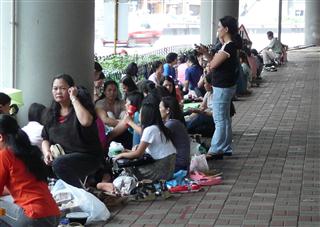
Our taxi had been arranged one hour later than our arrival, so we
wheeled the bikes to the designated meeting point in the car park and
waited for 45 minutes in the warm evening air, which wasn't a hardship.
Once loaded up we were driven to meet our Warm showers host, Phil Sam at
his apartment in Tue Moen to the west of Kowloon. He was waiting for us
on the street and made us very welcome, cooking a lovely pasta dinner
swilled down with a couple of bottles of the amber nectar.
The next morning we took the double deck bus into Hong Kong and walked
around the main shopping area in the rain. It was Sunday so it was very
crowded. Traditionally the Chinese work very hard and only have one day
off a week. Most families have a maid, usually Filipino and they all
meet up in the town on Sundays, sitting in large groups under the
walkways and in the parks eating picnics and chatting.
Afterwards we took the Star Ferry from Hong Kong to Kowloon, walking through the Harbour City mall to the China Ferry Terminal to check out the ferries for the journey into Guangdong, China. We bought tickets for HK$ 220 each (about GBP 18) and learned that we could either check the bikes in, provided they were in bags, at no cost or wheel them onto the boat ourselves at a charge of HK$70. We paid for the privilege of doing it ourselves. At least that way we were in control of them.
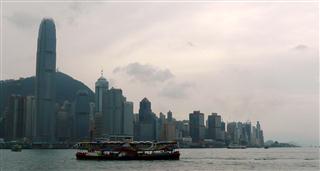
The shopping malls in Kowloon and Hong Kong are like towering temples of consumerism with all the big designer names there, Luis Vuiton, Chanel, Versace, Prada and many others. There were long queues of people outside each of them, waiting to be admitted to the hallowed inner sanctum to worship at the altar of their favourite designer. White gloved doormen limited admittance to heighten the impression of exclusivity. This one had a slightly more comical name.
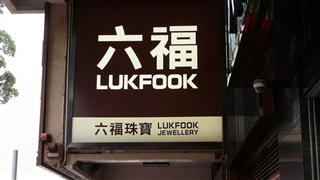
The road led us down to the water front and along the Pavement of Stars that celebrates Chinese cinema. Many of the great Chinese actors, (mostly unknown to us) have plaques in the pavement with their hand prints as per Broadway. Everyone in Hong Kong had to have their picture taken with the statue of the great Bruce Lee.
Walking around in a loop we worked our way through the night market,
which was basically a small china town market and back to the MTR
station to catch the subway back to Phil's place. Phil cooked again and
sat and watched "The King's Speech" (brilliant).
By the next morning, the weather hadn't improved so we decided to stay
at the apartment to sort out the bikes, plan our route and arrange
transport to the ferry terminal the next morning. The latter was much
more difficult than we had expected, (see note about transport and bikes
below). Few of the taxi van drivers wanted to be up early enough to
pick us up at 6-30am. However with the help of Phil's Chinese friend
Iris, we managed to sort it out an we retired to bed by 10-00 for an
early start the next day.
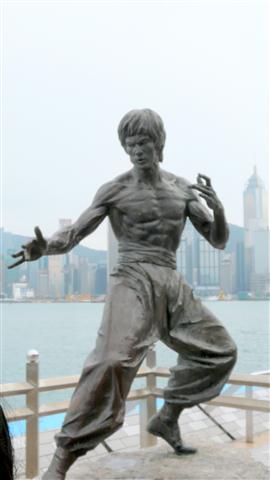
Hong Kong has over 18,000 taxis and is said to be the best system in the World. For sure it works well and is clearly defined with metered taxis.
- Red taxis - Urban
- Blue taxis - Lantau Island
- Green taxis - New Territories
They are usually happy to put a bike in the boot, necessitating at least
front wheel removal, but of course if there is more than one of you
that means more taxis.
The MTR is really quick, modern and comfortable. It is easy to use. You
can buy an Octopus card that you can charge up, a bit like an Oyster
card in London. It can also be used on Ferries and buses. Officially
there a few lines that you are allowed to take bikes but it is
prohibited on the remainder. Some people do take them on anyway and
provided the front wheel is removed and the bike shouldered it seems to
be accepted. However we read some very antagonistic comments by people
on the Geoexpat web site, so our preference is not to use the MTR.
Bikes are not allowed on buses.
Bikes can be taken on the train into Guangdong, China.
The easiest way although not the cheapest is to use the taxi vans.
These are not sanctioned by the HK authorities and accordingly the
registered taxi drivers don't like them. However they provide a
valuable service which the ordinary taxis don't, i.e. moving bulky or
awkward goods and passengers (some of the passengers may be awkward
too). Ours cost HK$250 from the airport to Tue Moen and HK$160 into
Kowloon from Tue Moen Beware though as they are not registered and
mostly not insured.
Bikes can also be taken on the normal steamer type ferries, but not on
all of the fast enclosed ferries. Check with the operator.
There is some great resource at Travel - Hong Kong Attractions.
Guangdong - Day 2 - Gaoming to Duanzhou
- Distance 68km
- Max Elevation 105m

Guangdong - Gaoming to Duanzhou Ride Profile
Ride Description
Waiting at the end of the lane with our bags and panniers, the taxi
arrived at 6-30 on the dot. We loaded up, said a fond farewell to Phil
and sped off into Kowloon. The process at the ferry terminal to
Guangdong was easy.
Dropped off in the underground car park we wheeled our bikes into the
lift and up into the terminal concourse. It is bright, airy and modern
with check in desks similar to an airport. We checked in at the
Guangdong ferry desk and had time for a coffee at Starbucks - all very
civilised. Then it was through the gate and passport control and after a
short wait, onto the boat. The bikes were secured on the rear deck, as
we all took our seats in the sealed cabin.
We were quickly across the bay of the Pearl River Mouth and heading up
the Xi Jiang river into Guangdong, its banks lined with factories,
quarries and other heavy industrial operations. It was not a pretty
route and with little to see we both dozed to the hum of the engine
while listening to our Michael Thomas easy Mandarin tape.
Alighting at the port of Gaoming in Guangdong province, the immigration
and customs formalities were as slick as those at Hong Kong. Many
passengers had their bags checked through scanner machines, but we were
just were just waved through. After a quick assessment of what side of
the road to ride on (right), we cycled off to the town centre. Its
square tenement blocks, shuttered shops and wide multi lane streets
were, as we would find, typical of the modern and soulless part of most
Chinese cities. Our first stop was to purchase a China Mobile Sim card
for our phone. China Mobil is the biggest Telecom provider in China and
is rolling out 3G in most areas. A SIM card was just 45 Yen = GBP5, and
seemed to last a long time even when using Google maps etc.
As it was now already lunch time we decide to stop for a traditional
Chinese lunch - a McDonald's Burger, Guangdong style - well it would
probably be the last chance for some western comfort food.
We negotiated our way out of the town on the main road, direction
Duanzhou also known as Zhao Qing (pronounced Tsow Ching). The whole
route was very industrial, with lots of horrible chemical smells. Buses
and lorries belching thick diesel smoke deafened us with their air horns
as they raced past. They stop for no-one or thing. Woe betide you if
you get in their way. We were not too impressed with Guangdong so far.
We kept going until we reached the Xi Jiang (river) again to catch the
small vehicle ferry across the river. It consisted of a floating
platform for the passengers and vehicles and was pulled across the fast
flowing river by a tug. Halfway across we were on an obvious collision
course with a river freighter and it seemed like the same rules apply to
shipping as on the roads - who is going to give in first? Eventually
the ferry stopped its engines and the ship crossed in front of us. On
the other side, the ride along the riverside promenade into the town was
sedate compared to the last three hours.
Our room at the Stars Business Hotel, was very comfortable, being more
like a suite. It was brand new and cost YEN 260, about GBP27. For
dinner, we went to the next door restaurant and had a traditional Guangdong style broth cooked over a heater in the centre of the table.
Raw ingredients were brought, beef, something that looked like "lites"
and pok choy. It was all tossed into the pot and we ate a tasty and
hearty meal with rice.
Guangdong - Day 3 - Duanzhou to Deqing
- Distance 96km
- Max Elevation 100m

Guangdong - Duanzhou to Deqing Ride Profile
Ride Description
We had the best night's sleep since we had arrived in Hong Kong. Was it
the riding, just a need for sleep or are we getting over the jet lag?
Either way we slept sound until 8-30.
Just over the road we had breakfast at one of the basic roadside joints.
It consisted of steamed rice pancakes with a small amount of minced
pork folded in. With a bit of soy and spicy sauce they were remarkably
tasty.
Getting out of the busy town was a challenge taking nearly two hours of
tortuous cycling in heavy traffic and only assisted by mostly Chinese
signage. We were really thankful for our GPS as we passed by the old
city walls.
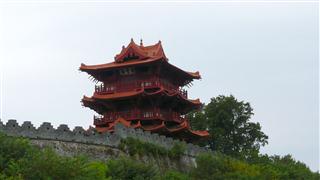
Along the way we stopped at the open park area at the side of the lake to watch a very impressive water fountain show in time to Chinese opera music. As it was a national holiday, the whole place had a relaxed atmosphere; a real contrast to the hustle and bustle of the city traffic.
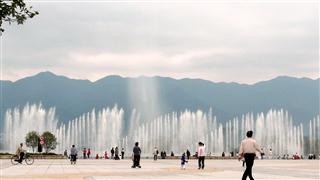
The road out of town was built up for miles and each section seemed to
specialise in something different, just as we had found in Malaysia and
Thailand. One section sold all motor bikes, while another sold all
ceramic tiles and sanitary ware. Yet another sold everything
reconditioned machinery; kilometre after kilometre of second hand fork
lift trucks, road making equipment, machine tools with smaller workshops
making steel doors, kitchen furniture and a whole host of other
recycled goods. This is certainly not a throw away society - not yet
anyway.
The road ran along the valley gouged out by the mighty Xi Jiang cutting
its way through the heart of Gunagdong and bounded by pine covered
hillsides. The road was only slightly less busy, as it continued as a
dual carriageway all the way to our destination. At one point the river
narrowed as it passed through a wide gorge. A new railway is being
constructed right through Guangdong province and an impressive bridge
was being built across it.
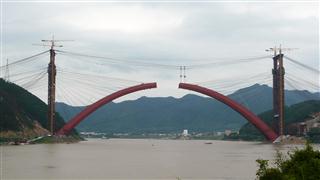
At Lubuzhen we stopped for "lunch". At least that's what it was called.
We chose two things off the menu, both of which had the symbol
associated with "meat". One turned out to be some sort of "intestines".
The other, we think was something like cow heel. It consisted of
chunks of gristle and hard cartilage like substance that wasted more
calories chewing it than we gained from eating it. Both of us usually
scoff at people that say "this food is sh**", but this really was quite
awful. Guangdong cuisine was equal only to its indutrial enivironment.
We ate most of the former, but hardly touched the latter. The sauce was
lovely though and the rice filled us up. (Always look for the
positive). The price GBP5!
After lunch the road was quieter with less traffic, but the lorries and
buses constantly blare their horns to encourage all lesser mortals to
get out of their way as they overtake at great speed. We have decided
that there cannot be any equivalent of the highway code in Guangdong.
Nobody abides by any traffic rules, overtaking, undertaking, driving
straight onto roundabouts, never looking when joining a main road from a
side road. We have yet to see a learner driver so can't believe there
is a driving test. In one town we passed through this afternoon there
had just been an RTA between a heavy lorry and a smaller van which had
tried to cut across the road in front of it. Despite an impressive array
of debris strewn over a wide area there didn't seem to be any blood and
gore.
We passed through several toll booths today. There is a bicycle lane at
the side so no toll to pay. At one there was a police checkpoint but
they just waved us through, smiling and waving as we passed. At 57kms we
arrived in a town called Yuecheng and hoped to stop there but there was
no hotel. A young local lad took several photos of us on his mobile,
telling Steve he was "handsome" and Karen she was "beautiful". Very
short sighted obviously.
There was now another 43km to cover to the next large town and only 2
hours of daylight left. Setting off with surprising energy we motored
along at about 22kph for the next hour. Karen was draughting Steve and
didn't see a heavy chunk of concrete on the hard shoulder. Her front
wheel hit and she was thrown off, luckily towards the ditch. She was
fortunate not to have hit one of the concrete posts along the kerbside,
but she did come down with a bang on the kerb, grazing her forearm and
knee. She though she had cracked a rib, but later it turned out not to
be the case otherwise the pain would have been much worse. The bike took
a hit too. Its handlebars were twisted round, the bar end had broken
off and we couldn't tell if the forks had been bent. It took about 20
mins to make it rideable again. T would take a bit longer for Karen's
body and pride to heal. Despite the accident, she was lucky it could
have been a lot worse and we both rode on in silence pondering what
could have been and if that decision to leave the helmets at home was a
bad one.
It was just getting dusk as we rode into Deging and booked into the
first hotel we saw, the Guanglin, just on the outskirts of the town.
Again a good class of hotel with a fabulous bathroom and two double beds
for GBP 26 a night.
We walked into town for something to eat, choosing a popular roadside
place with the usual plastic tables and greasy tablecloths. The food was
amazing, tasty, good quality and loads of it. Suddenly we love
Guangdong food again. The beer was good too and dulled the pain in the
legs and the ribs.
Guangdong - Day 4 - Deqing to Changzou (Wuzhou)
- Distance 77km
- Max Elevation 135km

Guangdong - Deqing to Changzou (Wuzhou) Ride Profile
Ride Description
The room rate included breakfast so it was fun walking round the buffet
table lifting up all the lids on the food warmers to suss out what the
Chinese eat for breakfast. There was flat noodles with chillies, dim
sum, little frankfurter sausages, hard boiled eggs and some cabbage soup
as well as a selection of completely tasteless and revolting sweet
jelly things.
The route continued along the dual carriageway up the Xi Jiang valley.
There was even less traffic and the surroundings were more rural with
only occasional factories.
For lunch we turned off the main road into a small town and went into
the first cafe. Learning from the mistake of the day before we pointed
to the food that the man on the next table was eating and asked for two
portions of that. The family who owned the cafe were very interested in
us and their daughter spoke a little English. They were all was
fascinated by our map of Guangdong with English place names. Our two
plates of rice, pork and greens with as much tea as we could drink was
GBP 1-20.
The road here runs along the side of the still massive river. It is one
of the most important transport routes in Guangdong with large freight
boats plying up and down. In the past there were lots of passenger
ferries but as more and more bridges are constructed there are only a
few left.
Here, we crossed the provincial border from Guangdong into Guangxi.
Coming into Wozhou it was difficult to identify where the town centre
was. After a fruitless journey through narrow busy streets following a
"hotel" sign to a place that was closed down, we headed over the river.
The street was lined with residential blocks but no hotels. We stopped
to try to decide where to go next and a local woman spoke to us. She
could understand a little English but couldn't explain how to find the
hotel so she walked with us, about 1km, to show us where to go.
The Xin Lu Ye Hotel was not quite the standard of those that we had
stayed in the last 2 nights but was clean and had a good size room with
hot shower for GBP 12. As in many of the hotels in China, the rooms
could be booked by the hour. The many chargeable extras available in the
room included 2 condoms and a vibrator and before you ask, no we didn't
partake. - We were way too tired for any "how's your father".
Near the hotel we explored a traditional Chinese street market where
most of the vendors sat on the floor with their goods laid out on
sheets. There were vegetables, pork ribs, whole steamed chickens,
terrapins, eels, goldfish, honey in the comb and all manner of seeds and
dried fruits. One of the women had a bucket of fat live frogs and was
cutting them open and removing their innards as they kicked and
struggled vigorously. The children looked on, fascinated.
That night we dined in the very popular restaurant next door to the
hotel. It was one of those places that has a paper menu with a long list
of all the food available and you tick off what you want. Luckily there
was also a picture menu so we chose a few dishes and had a very good
meal.
Guangdong - Day 5 - Changzou (Wuzhou)
Ride Description
Now, strictly speaking, Wuzhou is in Guangxi Province not Guangdong, but
we left it in this section for the sake of completeness.
It never stopped raining all night and was still pouring when we
got up. The weather forecast was for lots more rain so as we had a 100km
day planned we decided to stay another night and hope for better
weather the next day. Going back into the same restaurant for breakfast
caused some consternation among the staff. One young lad drew the short
straw but was actually very helpful and helped us order a variety of
things including pancakes and some delicious egg custard tarts.
The most important thing to do today was to top-up our phone credit. We
didn't expect it to be a problem as there were lots of China Mobile
shops close to the hotel. In the first, the assistant couldn't
understand what we wanted. She sent us down to another shop further
along the road. They sent us across the road but still there was no way
we could get across what we were after. In desperation we went down the
road to a music shop, hoping to find an English speaker. The young
female assistant was a piano music student at the local college, spoke
good English and took us to a shop to buy a top-up card.
If you enjoyed our Guangdong page, why not have a look at some of our other Cycling China trips, such as:
Cycling in Guangxi
Cycling in Guizhou
Or you can return to our
Home Page from Guangdong
or return to the top of this page
New! Comments
Have your say about what you just read! Leave me a comment in the box below.